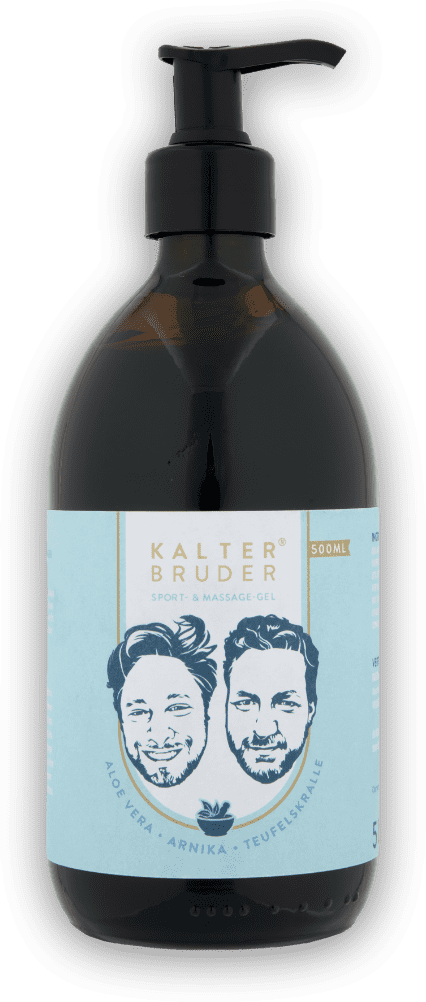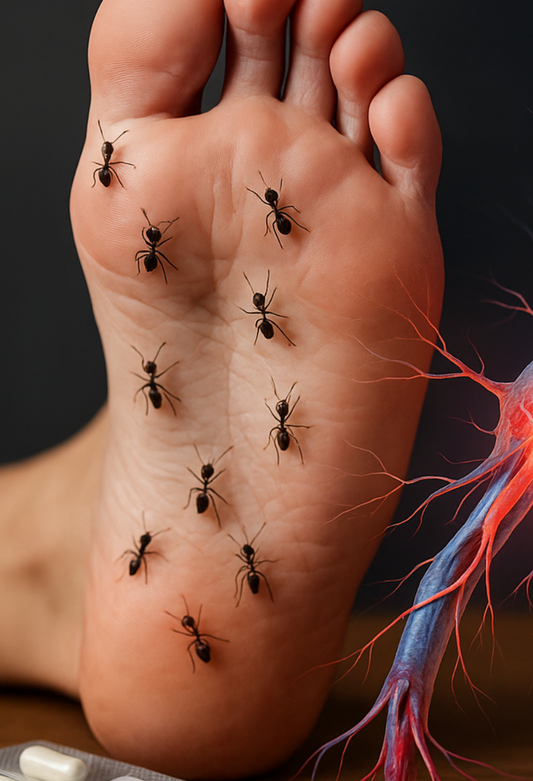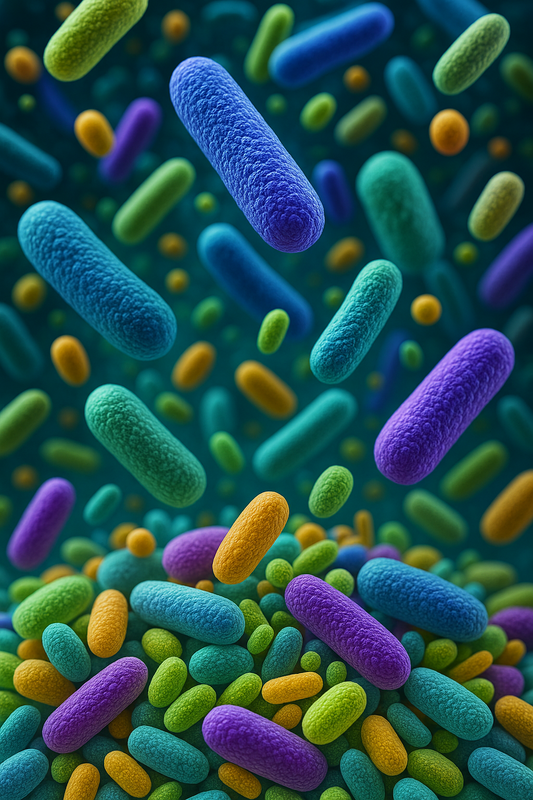How it works, why medications do more harm than good and what really helps.
Colds, flu, coughs: We all know the symptoms, and most people rush to the pharmacy to buy some remedies. But did you know that many cold remedies actually do more harm than good to your body? In fact, many of these products can relieve symptoms in the short term, but they often weaken your immune system because they suppress your natural defenses. In this article, you'll learn how your immune system really works, why dietary supplements are ineffective - and how you can strengthen it better with the right diet.

How our immune system works
Maybe you remember the cartoon series “Once upon a time... life” (picture above). In this series, little men traveled through our bodies in spaceships that flew through the bloodstream and showed us how blood cells, nerves and organs work together. The tiny figures represented important cell types that explained the immune system, the nervous system or digestion in a visual way. A perfect example to understand how our immune system works!
Imagine your immune system as a big city. There is the "police" - the white blood cells that recognize and fight invaders such as bacteria and viruses. As soon as an enemy is spotted, they call for reinforcements and the phagocytes (macrophages) set off to devour the invaders - similar to the garbage collectors that dispose of anything harmful. Then there is the "secret service" - the T cells and B cells. The T cells attack infected cells directly, while the B cells produce antibodies that specifically neutralize certain pathogens. These antibodies function like special agents: they store knowledge about the invader and immediately eliminate it if it shows up again.
And your immune system is capable of learning. Once it has defeated a pathogen, it can store this information and react more quickly and effectively if it is attacked again. This means that your body becomes immune to many diseases - such as chickenpox - after a second contact. This interplay of attack, defense and learning makes your immune system one of the most powerful systems in your body - and it can do much more than just fight colds.
Why cold medicines often do more harm than good
So why do we reach for cold medicine so quickly? The answer is simple: because we are impatient and want to "push away" symptoms such as a runny nose or fever. Our immune system needs time to work effectively. And... as the saying goes: "Where there's a saw, there's a saw" - fever, for example, heats up your body to kill viruses. A runny nose and cough transport the pathogens out of your body. If you take medicine now because you want or need to "function" again quickly, you are suppressing these important functions and disrupting your immune system's work.
This does not mean that you should never take medication - fever can be dangerous for certain risk groups and should of course be treated. But in many cases it is enough to give your body rest and provide it with the right nutrients to support its self-healing powers. Medication often only alleviates the symptoms, while your body has to fight the actual pathogens.
Cold medicines that reduce fever or clear the nose inhibit the natural defense mechanisms and thus often delay healing. Studies even show that certain medicines can increase the risk of complications such as pneumonia because they weaken the immune system instead of supporting it. So it's better to give your body time to defend itself naturally.
Why Real Food is Better Than Supplements
You may have already noticed that dietary supplements are currently experiencing a real boom. In Germany alone, the industry's turnover is now over 2 billion euros annually - and rising. Manufacturers lure customers with promises such as "more energy", "better immune system" or "less stress". But the truth is: in many cases these products are unnecessary and can even be harmful in high doses.
Your body does not need isolated vitamins or minerals from the pill - it needs nutrients in their natural combination. Nutrient-rich foods not only provide vitamins and minerals, but also fiber and phytochemicals, which are crucial for the absorption and utilization of nutrients in the body. Fruit, vegetables, nuts and seeds contain a variety of substances that work together to support the immune system. These important accompanying substances are often missing in supplements, meaning that the body cannot absorb the nutrients optimally.
For example, vitamin C in fruit is absorbed much better by the body than in pill form because it is combined with other plant substances. So you can do more for your immune system with a fresh pepper than with an expensive vitamin C tablet.

Food for your immune system – these nutrients strengthen your defenses
Instead of relying on artificial vitamins, you should support your immune system with the power of natural foods. Here are the most important nutrients that strengthen your defenses:
Vitamin C – The Classic
Vitamin C is an antioxidant that protects your cells from damage and supports your white blood cells. It helps your body respond more quickly to infections. The 5 best sources of vitamin C:
- acerola cherries
- paprika
- black currants
- kiwis
- citrus fruits (oranges, lemons)
Vitamin D – The immune booster
Vitamin D activates immune cells and ensures a rapid defense reaction. The supply is often insufficient, especially in winter, so it is important to eat foods rich in vitamin D. The 5 best sources of vitamin D:
- Salmon
- egg yolk
- cod liver oil
- Mushrooms
- Fortified foods (e.g. margarine)
Zinc – The immune system
Zinc is important for the formation of white blood cells and supports healing. A zinc deficiency significantly weakens the immune system. The 5 best sources of zinc:
- oysters
- beef
- pumpkin seeds
- cashews
- chickpeas
Omega-3 fatty acids – the anti-inflammatory
Omega-3 fatty acids have an anti-inflammatory effect and support cell regeneration. The 5 best sources of omega-3:
- linseed
- chia seeds
- walnuts
- Salmon
- herring
Probiotics – Your intestinal flora as a defense center
About 70% of your immune system is located in the intestines. Probiotic foods promote healthy intestinal flora, which supports the immune system. The 5 best sources of probiotics:
- natural yogurt
- sauerkraut
- kimchi
- kefir
- miso
What's the deal with Grandma's chicken soup?
Grandma's chicken soup has been a home remedy for colds for generations - but what is the truth? In fact, there is scientific evidence that chicken soup has anti-inflammatory properties. The secret lies in cysteine, an amino acid that is released when the chicken is cooked. Cysteine is similar to a mucus-loosening drug sold in pharmacies. It has an expectorant effect and helps to clear the airways by thinning the mucus. But be careful: the ready-made canned soup from the supermarket often cannot keep up - too much salt and too few fresh ingredients. It is best to cook the soup yourself to reap the full health benefits.

How many nutrients does your body really need?
If you have a cold, for example, it can be useful to take in slightly higher amounts of certain nutrients to support your immune system. Here are the recommended daily doses (not the maximum doses) for certain nutrients that are helpful when you have a cold:
- Vitamin C :
- Recommended daily dose : 100-200 mg per day.
- Increased dose for colds : 250-500 mg per day.
- Food example : That would be about 1-2 oranges or a large red pepper (about 200 mg vitamin C per pepper).
- Vitamin D :
- Recommended daily dose : 20 µg (800 IU) per day.
- Increased dose for colds : 25-50 µg (1000-2000 IU) per day, especially in winter.
- Food example : Approx. 100-200 g of salmon (rich in vitamin D) or 4-5 eggs (about 10 µg of vitamin D per egg).
- Zinc :
- Recommended daily dose : 10-15 mg per day.
- Increased dose for colds : 15-25 mg per day.
- Food example : 50-75 g pumpkin seeds (about 10 mg zinc per 50 g) or 150-200 g beef (about 6 mg zinc per 100 g).
- Omega-3 fatty acids :
- Recommended daily dose : 1-2 g per day.
- Increased dose for colds : Up to 2-3 g per day.
- Food example : 1 tablespoon of flaxseed oil or 100-150 g of fatty fish (such as salmon or mackerel) is enough to cover this amount.
- Probiotics (for gut health) :
- Recommended daily dose : There is no fixed dose, but daily intake of probiotic foods is advisable.
- Food example : One portion (approx. 150-200 g) of natural yoghurt or kefir provides sufficient probiotics for daily support of the immune system.
Example day to strengthen your immune system
Here is an example of how you can meet your daily requirement of important nutrients without any dietary supplements:
Breakfast :
- Natural yoghurt with a handful of walnuts and linseed, plus half a pepper and a kiwi (vitamin C, probiotics, omega-3)
Lunch :
- Grilled salmon with quinoa and a side dish of broccoli and mushrooms (vitamin D, omega-3, zinc)
Afternoon snack :
- A handful of pumpkin seeds and a glass of freshly squeezed orange juice (vitamin C, zinc)
Dinner :
- Homemade chicken soup with plenty of vegetables such as carrots, celery and onions (cysteine, vitamin C, probiotics)
Before going to bed :
- A glass of kefir (probiotics)
With this meal plan, you will not only cover the most important nutrients for a strong immune system, but also promote general health without having to resort to supplements. A balanced diet with fresh, natural foods is the best way to strengthen your immune system and keep your body healthy.
Conclusion
Your immune system is your personal shield against illness and more than just a cold defense. It is constantly working to keep your body healthy, but it takes time to do its job. Instead of immediately reaching for medications that often only suppress symptoms, you can support it with rest and the right diet. Focus on fresh, natural foods that are full of vitamins, minerals and antioxidants and avoid unnecessary supplements. With the right nutrients, enough exercise and a stress-free lifestyle, you give your immune system everything it needs to keep you strong and healthy.















